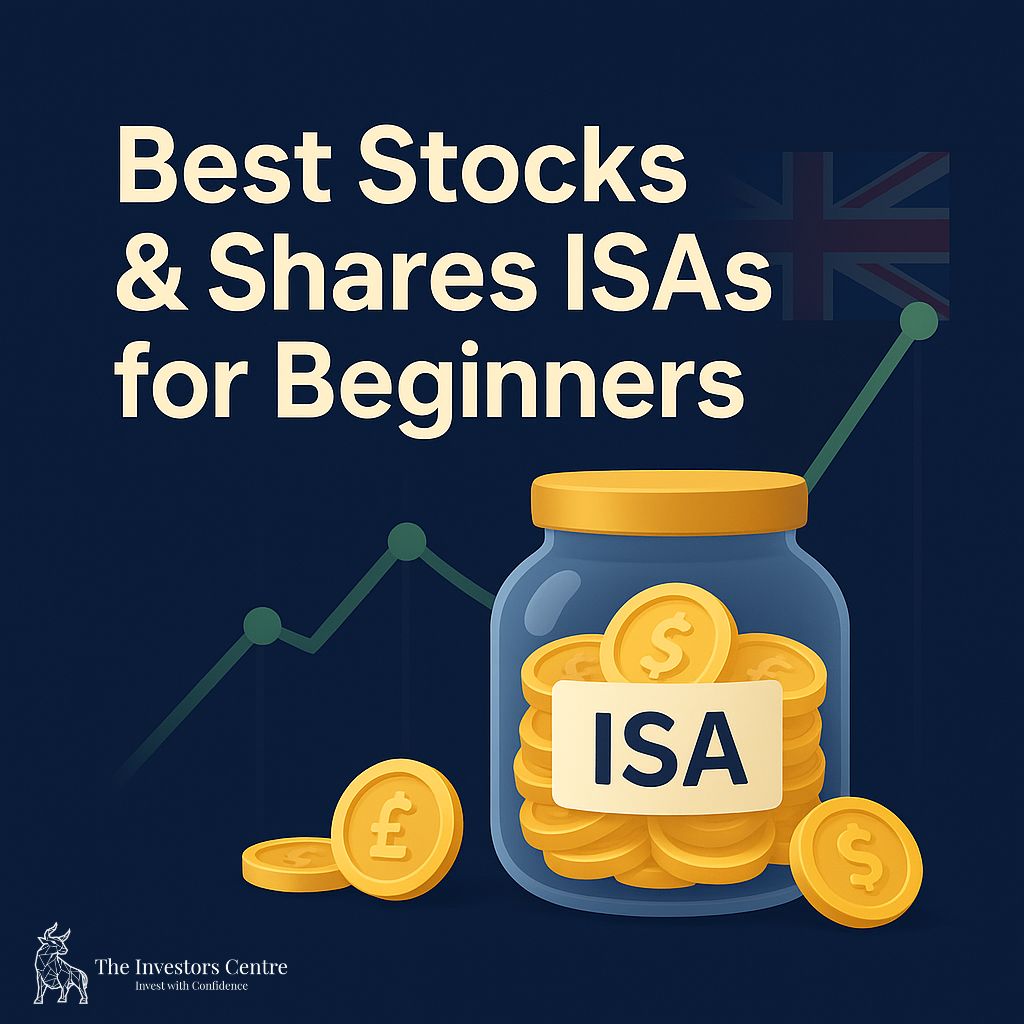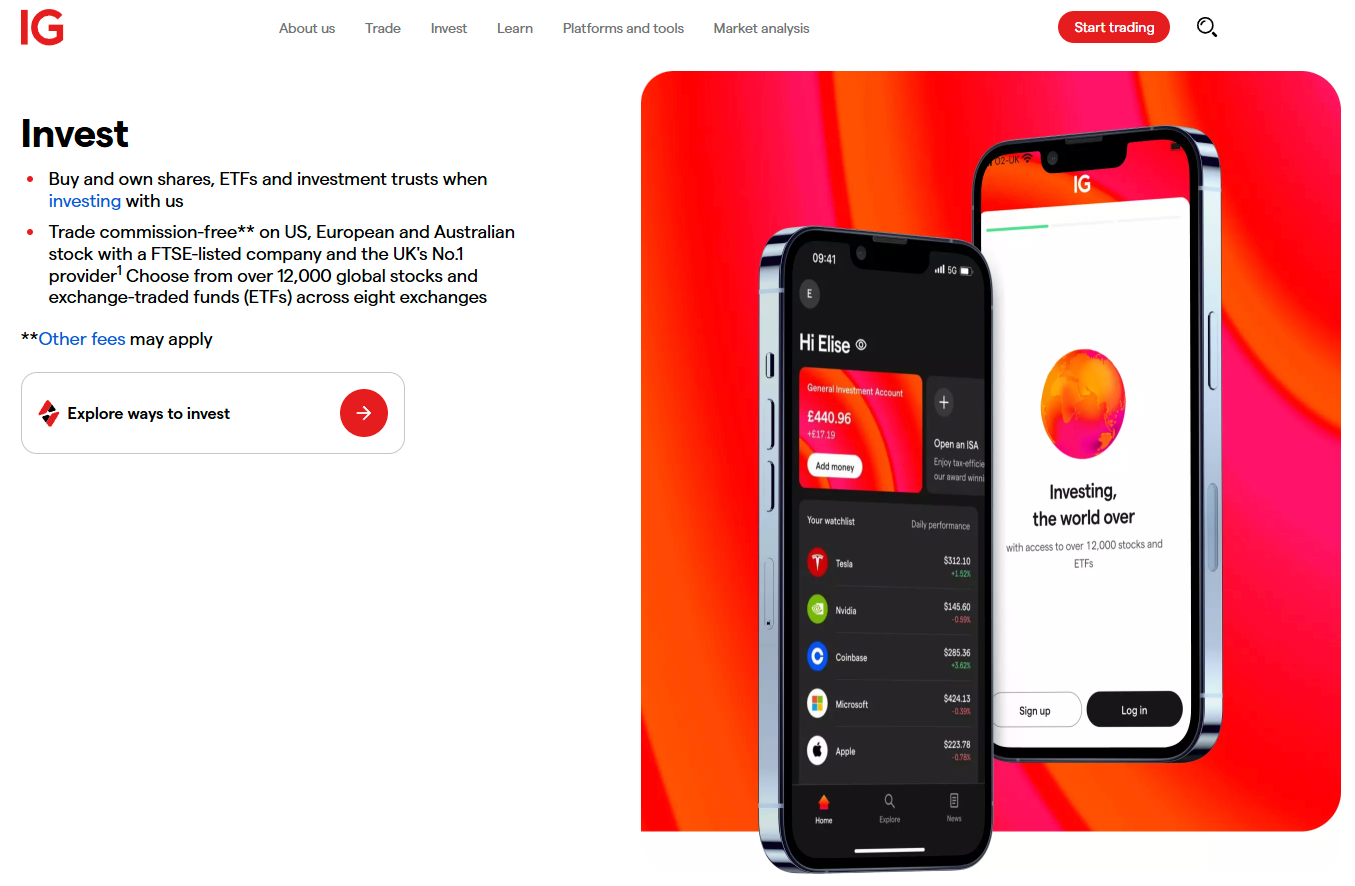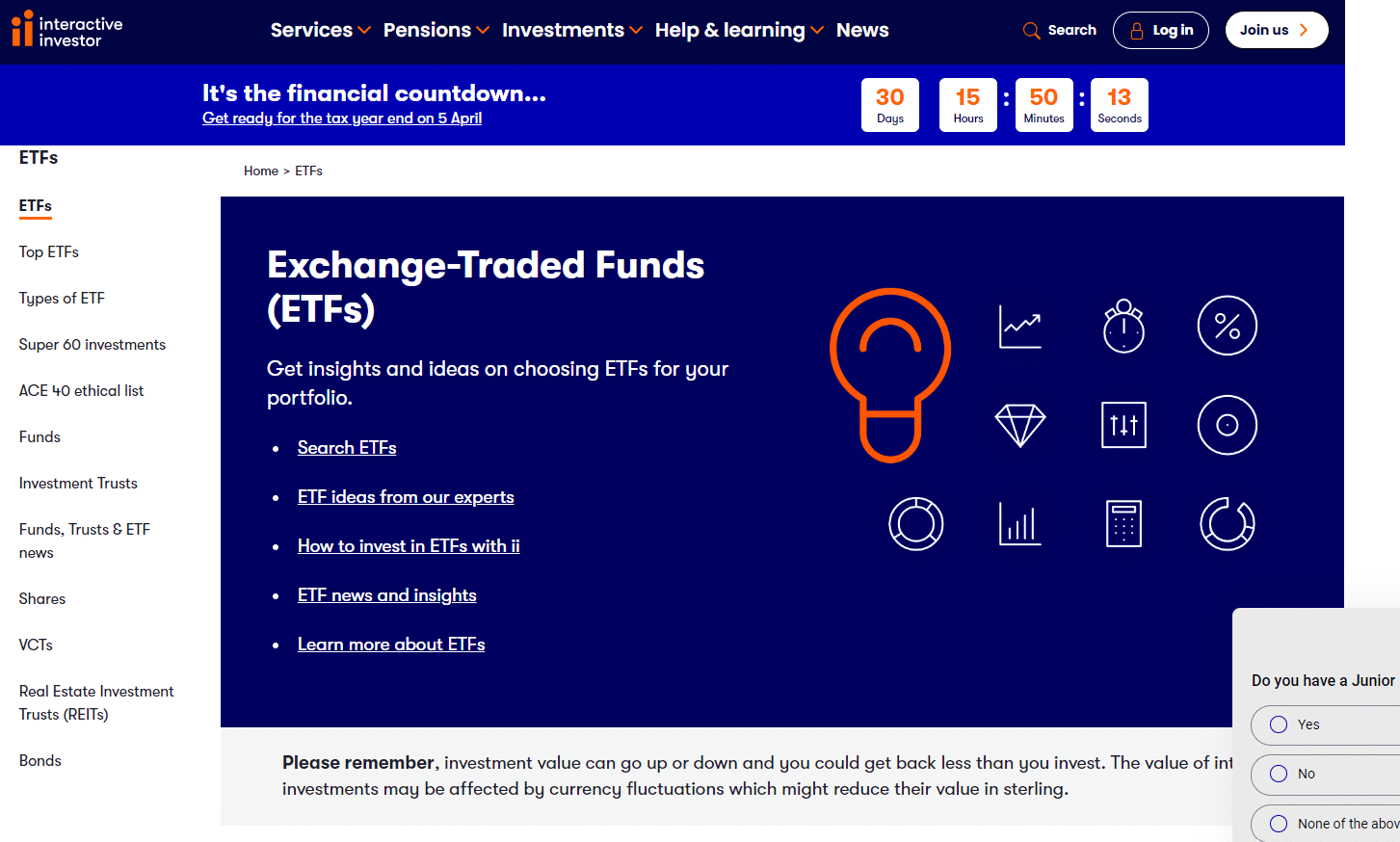Best Stocks and Shares ISAs for Beginners UK | Compare Top Options
Stocks and Shares ISAs help UK beginners invest tax-efficiently. With a £20,000 allowance, they support long-term growth. In 2025 many investing platforms offer strong options — there’s no wrong choice, only the best fit for your needs.

- expertise:
- CFD Trading, Forex, Derivatives, Risk Management
- credentials:
- Chartered ACII (2018) · Trading since 2012
- tested:
- 40+ forex & CFD platforms with live accounts

- expertise:
- Platform Testing, Cryptocurrency, Retail Investing
- credentials:
- Active investor since 2013 · 11+ years experience
- tested:
- 50+ platforms · 200+ guides authored
How We Test
Real accounts. Real money. Real trades. No demo accounts or press releases.
What we measure:
- Spreads vs advertised rates
- Execution speed and slippage
- Hidden fees (overnight, withdrawal, conversion)
- Actual withdrawal times
Scoring:
Fees (25%) · Platform (20%) · Assets (15%) · Mobile (15%) · Tools (10%) · Support (10%) · Regulation (5%)
Regulatory checks:
FCA Register verification · FSCS protection
Testing team:
Adam Woodhead (investing since 2013), Thomas Drury (Chartered ACII, 2018), Dom Farnell (investing since 2013) — 50+ platforms with funded accounts
Quarterly reviews · Corrections: info@theinvestorscentre.co.uk
Disclaimer
Not financial advice. Educational content only. We're not FCA authorised. Consult a qualified advisor before investing.
Capital at risk. Investments can fall. Past performance doesn't guarantee future results.
CFD warning. 67-84% of retail accounts lose money trading CFDs. High risk due to leverage.
Contact: info@theinvestorscentre.co.uk
Quick Answer – What's the Best Stocks and Shares ISA for Beginners?
For beginners, the best Stocks and Shares ISA balances low fees, usability, and fund access. In 2026, IG leads for market access, Interactive Investor suits frequent investors, Hargreaves Lansdown offers strong support, Trading 212 delivers commission-free trades, and eToro provides social investing through its Moneyfarm partnership.


When Investing, Your Capital is at Risk.

When Investing, Your Capital is at Risk.

When Investing, Your Capital is at Risk.

61% of retail CFD accounts lose money when trading CFDs with this provider.

62.5% of Retail CFD Accounts Lose Money
How do These Stocks and Shares ISA Platforms Compare?
| # | Platform | Monthly/Annual Fees | Trading Costs | FX Fees | Trustpilot Score | Best For | Get Started |
|---|---|---|---|---|---|---|---|
| 1 | IG | £0 platform fee | Commission-free UK/US shares | 0.7% | 4.0/5 | Market access | Visit |
| 2 | Interactive Investor | £4.99–£11.99/month | £3.99 UK/US trades | 1.5% | 4.2/5 | Frequent investors | Visit |
| 3 | Hargreaves Lansdown | Up to £45/year | £11.95 per trade | ~1% | 4.1/5 | Beginner support | Visit |
| 4 | eToro | £0 ISA (via Moneyfarm) | Free to open/$5 withdrawal | ~0.5% | 4.1/5 | Social investing | Visit |
| 5 | Interactive Brokers | £0 platform fee | From $1 per trade | ~0.2%–0.7% | 4.2/5 | Low-cost global access | Visit |
Here's the Top 5 Best Beginner Stocks and Shares ISA Platforms in the UK:
1. IG — Market Access, Advanced Tools, Trusted Provider
2. Interactive Investor — Flat Fees, Wide Choice, Long-Term Value
3. Hargreaves Lansdown — Strong Support, Educational Tools, Trusted Brand
4. eToro — Social Trading, Easy to Use, Beginner-Friendly
5. Interactive Brokers — Low Costs, Global Reach, Professional Platform

IG — Best for Education and Platform Tools
IG is a strong choice for beginners who want to grow into more active trading. It supports ISAs, offers a free demo account, and includes top-tier charting tools. Beginners also benefit from in-depth educational resources via IG Academy.

Pros
- Wide market access with 17,000+ options
- Commission-free UK and US share dealing
- FCA-regulated with FSCS protection
Cons
- 0.7% FX fee on international trades
- Some may consider interface less intuitive than some others
Is IG the right Stocks and Shares ISA for UK beginners?
IG suits beginners seeking wide market access and commission-free share dealing. Its reputation and regulation provide confidence, though the platform leans towards learned users. Those willing to learn will benefit from its tools, but absolute beginners may prefer a simpler interface.

Interactive Investor — Best for Long-Term ISA Investors
Interactive Investor appeals to beginners planning regular investing. Its flat fee works best for medium-to-large portfolios, while free scheduled investments reduce costs. The platform provides a wide choice of funds and strong investor resources, but small-balance beginners may find the monthly fee heavy.

Pros
- Flat monthly fee keeps costs predictable
- Wide choice of funds and shares
- FCA-regulated, trusted provider
- Free regular investing
Cons
- 1.5% FX fee is high
- No fractional share access
How does II's flat-fee model work for small portfolios?
II charges £4.99–£11.99 monthly, regardless of portfolio size. For beginners investing only small sums, this fee may outweigh benefits. As portfolios grow, the fixed cost becomes efficient. Beginners should weigh initial affordability against long-term value before committing.
What funds and shares are available in an II ISA?
Interactive Investor offers UK and global shares, ETFs, and thousands of funds. Beginners can access model portfolios and themed investments. Its extensive fund range allows flexible diversification, making it suitable for those learning to balance risk and explore different markets within one ISA.
How Easy Is It to Use?
II's interface is clean and intuitive, with guided navigation for setting up an account or placing trades. Beginners will appreciate the ISA-focused dashboard and support content, though the design is less modern than eToro or Trading 212.

Hargreaves Lansdown — Trusted but Higher-Cost Option
Hargreaves Lansdown suits beginners prioritising guidance and customer support. While costs are higher, its educational tools and accessible platform help new investors build confidence. For those valuing service over price, HL can justify its premium, though fee-sensitive beginners may prefer lower-cost options.

Pros
- Highly rated customer support
- User-friendly tools and resources
- Broad investment choice, including funds and ETFs
- Trusted UK brand with FSCS protection
Cons
- Higher fees than many competitors
- FX costs up to 1%
How does HL's customer support help new investors?
HL provides extensive investor education, phone support, and portfolio tools. Beginners benefit from easy-to-understand resources and strong assistance. This support structure helps reduce mistakes and build confidence, making HL one of the most accessible platforms for newcomers despite its higher pricing.
What are the drawbacks of HL for beginner ISA holders?
The main drawback is cost. With platform fees up to £45 annually, plus higher trading charges, beginners with smaller portfolios may see returns reduced. FX fees are also higher than rivals, which makes global investing less efficient for cost-sensitive new investors.

eToro — Best Overall for Beginners
eToro is the #1 platform for UK beginners in 2026 due to its 0% commission stock investing, intuitive mobile app, and unique CopyTrader feature. It now has ISA support for managed and DIY and shines in user experience, crypto access, and educational tools built into the platform.

Pros
- 0% commission stocks
- Copy trading with social features
- Beginner-friendly layout
Cons
- Limited UK-listed shares
- USD-based account incurs FX fees
- Wider spreads than some competitors
How Beginner Friendly is eToro?
Beginners love eToro for its clean design, fast sign-up, and ability to copy top investors. No complex charts are required, and it's easy to start with £50. The mobile app mirrors the web version, making portfolio tracking and trading seamless.
Is eToro Safe and FCA-Regulated?
Yes, eToro is FCA-regulated in the UK, holds client funds in segregated accounts, and offers two-factor authentication. It's also licensed in Europe, Australia, and the US, giving it a strong compliance framework trusted by millions of investors worldwide.

Interactive Brokers — Best for Global Market Access
Interactive Brokers appeals to beginners seeking low-cost trades and global reach. It offers a professional-grade platform with competitive fees, making it cost-effective for ambitious investors. However, its steep learning curve may challenge those looking for a simple, entry-level experience.

Pros
- Extremely low trading commissions
- Access to 150+ global markets
- Advanced tools and research
- Strong reputation and regulation
Cons
- Platform complex for beginners
- £10 monthly inactivity fee (waived with activity)
What are the limitations of Interactive Brokers' ISA?
IBKR offers global market access but is less beginner-friendly. The interface and tools are designed for advanced investors. Inactivity fees may apply, and the platform lacks the simplicity found in rivals like HL or eToro. Beginners must be prepared to learn the system.
Does Interactive Brokers offer funds as well as shares?
Yes. IBKR supports shares, ETFs, funds, bonds, and options across international markets. Beginners gain broad diversification potential but may find the sheer choice overwhelming. Clear strategies and focus on simple funds can help new investors benefit without being overloaded by advanced instruments.
How to Choose the Best Stocks and Shares ISA as a Beginner
What factors should beginners prioritise when picking an ISA?
Beginners should prioritise low fees, simple usability, FSCS protection, and access to diversified investments. Educational tools and responsive support are valuable. Balancing costs with available guidance ensures beginners gain confidence, while a broad choice of funds and shares supports gradual, low-risk portfolio building.
How do ISA fees affect long-term beginner returns?
High fees reduce compounding power. For example, a £25,000 ISA can cost £50–£130 annually in platform fees alone. Over decades, this difference compounds into thousands. Beginners should favour providers with transparent, low-cost structures, particularly if starting with smaller portfolios, to maximise net returns.
Should beginners start with funds or individual shares?
Funds, especially index funds and ETFs, provide instant diversification and lower risk, making them suitable for beginners. Individual shares carry higher volatility and require research. Beginners often start with funds, then gradually explore shares once comfortable with market basics and portfolio management.
How important is platform usability for new investors?
Very important. A clear, intuitive interface helps beginners avoid mistakes, track investments, and build confidence. Complex platforms can overwhelm new investors, leading to poor decisions. Beginners benefit from platforms offering simple layouts, mobile apps, and educational resources to guide them through first steps.
Step-by-Step Guide: How to Get Started with a Stocks and Shares ISA
Step 1 – Understand the annual ISA allowance
Learn that you can invest up to £20,000 each tax year across ISAs. Knowing this limit ensures beginners plan contributions effectively, without breaching HMRC rules.
Step 2 – Compare the best beginner-friendly platforms
Assess fees, usability, Trustpilot scores, and fund access. Choose a provider balancing cost with beginner support.
Step 3 – Decide between funds or individual shares
Funds suit hands-off beginners seeking diversification; shares suit those comfortable with research and higher risk.
Step 4 – Open and fund your ISA account
Apply online with your chosen provider. Deposit funds by bank transfer or direct debit.
Step 5 – Choose your first investments
Select diversified funds or beginner-friendly ETFs. Avoid concentrating in single stocks. Investing the full £20,000 allowance annually could grow to £661,000 in 20 years at 5% returns, showing the power of compounding.
Step 6 – Monitor your ISA and invest regularly
Check performance periodically, reinvest dividends, and contribute consistently. Avoid overreacting to short-term market changes.
Risks and Safety of Stocks and Shares ISAs
Can you lose money in a Stocks and Shares ISA?
Yes. Market values fluctuate, and investments can fall as well as rise. Unlike cash savings, capital is not guaranteed. However, long-term investing in diversified funds usually reduces risk, and tax advantages make ISAs efficient despite short-term volatility.
Are Stocks and Shares ISAs safe for UK beginners?
They are safe when using FCA-regulated providers with FSCS protection up to £85,000. Beginners should avoid unregulated platforms. Market risk remains, but regulatory safeguards and responsible diversification protect investors against fraud and platform failure.
How to reduce risk in a beginner's ISA portfolio
Diversify across funds, asset classes, and regions. Use low-cost index funds to spread risk. Avoid chasing trends or concentrating in single sectors. Consistent contributions and a long-term horizon help reduce the impact of market downturns on overall ISA growth.
Common Beginner Mistakes with Stocks and Shares ISAs
What mistakes do new ISA investors usually make?
Common mistakes include chasing hot stocks, neglecting diversification, overtrading, and ignoring fees. Beginners sometimes panic-sell during downturns. A disciplined, long-term strategy using diversified funds usually performs better than frequent, emotional trading decisions.
Why is diversification essential for beginners?
Diversification spreads risk, ensuring one poor-performing investment does not wipe out gains. Beginners using funds or ETFs gain exposure across hundreds of companies, balancing performance and reducing volatility. This approach suits long-term growth while protecting against individual market shocks.
How to avoid overtrading inside an ISA?
Set clear goals, use regular contributions, and avoid daily monitoring. Overtrading increases fees and tax-free gains risk reduction. Beginners should treat ISAs as long-term vehicles, focusing on growth over years rather than short-term speculation.
What happens if you exceed the ISA allowance?
Exceeding the £20,000 allowance breaches HMRC rules. Excess funds lose ISA status, and penalties may apply. Providers usually prevent over-contributions, but beginners should track deposits carefully. Sticking within the limit ensures full tax advantages are maintained.
Final Thoughts – Which Beginner Platform Should You Choose?
The best Stocks and Shares ISA for beginners depends on balancing fees, usability, and investment choice. IG, Interactive Investor, HL, eToro, and Interactive Brokers each serve different needs. There is no wrong answer — the best ISA is the one aligned with your goals.
- IG – best for beginners wanting UK and global market access.
- Interactive Investor – best for frequent investors building larger portfolios.
- Hargreaves Lansdown – best for beginners valuing strong support and guidance.
- eToro – best for social investors wanting copy trading and ready-made portfolios.
- Interactive Brokers – best for ambitious beginners seeking low-cost, global trading tools.
FAQs
Which investment platform is best for Stocks and Shares ISAs in the UK?
IG ranks highest for market access, Interactive Investor suits frequent investors, HL supports beginners with guidance, eToro appeals to social investors. The right choice depends on priorities: fees, usability, or support.
Are Stocks and Shares ISAs good for short-term investing?
They are designed for long-term investing. Short-term use exposes beginners to volatility, with little time for recovery. For funds needed within five years, cash savings accounts are safer. Stocks and Shares ISAs work best for goals beyond five years.
Do I pay tax on profits inside a Stocks and Shares ISA?
No. Capital gains, dividends, and interest earned within a Stocks and Shares ISA are exempt from tax. This makes them one of the most efficient ways for UK beginners to invest long-term while keeping more of their returns.
Can I transfer my Cash ISA into a Stocks and Shares ISA?
Yes. Transfers are allowed without losing ISA status. Beginners should request a formal transfer through their new provider, not withdraw funds directly, to preserve tax benefits. Many investors move from Cash to Stocks and Shares ISAs for higher growth potential.
